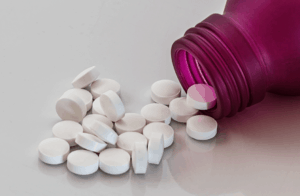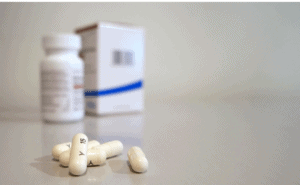There are drugs that stimulate and drugs that depress. Stimulating substances are referred to as “uppers” while depressants are labeled “downers”. These terms are attributed to the physical and mental reactions a user experiences while intoxicated by a specific substance. As stimulants, uppers produce an increase in energy, feelings of invincibility, and sharpened focus while downers act as depressants, inducing lethargy, feelings of euphoria, and relief from discomfort.
Although they produce counter effects, both uppers and downers are equally capable of inflicting damage to the user. Complications associated with uppers include rapid heart rate, high blood pressure, and aggression whereas downers contribute to breathing suppression, low blood pressure, and impairment of motor skills.

Is Adderall an Upper or Downer?
Adderall is an amphetamine, categorizing it as an upper. Commonly prescribed to treat disorders such as ADHD and narcolepsy, Adderall is one of the most prescribed medications in the United States with over 25 million active prescriptions in circulation.
Misuse And Abuse of Uppers
It is estimated that prescriptions for ADHD medications such as Adderall are written for more than 2.7 million children per year. In 2010, US poison centers reported 17,000 human exposures to ADHD medications, with 80% occurring in children <19 years old and 20% in adults. Because many uppers come prescribed from a healthcare professional and are instructed to be taken daily, a person using uppers may not recognize if they have developed a dependence or addiction to the medication they are taking. Furthermore, they may not be able to recognize the signs or symptoms of abuse of their medication, either.
Uppers such as Adderall may be abused in a number of ways. If you are prescribed an upper—also referred to as a prescription stimulant—it is considered abuse if you take the medication in a way other than prescribed, which generally means taking more than prescribed. You may also abuse an upper by taking medication prescribed to someone else. In general, the abuse of an upper can be summarized as taking the drug only for the effects of it— seeking to get high.
There are many reasons people abuse uppers, commonly including effects of getting “borrowed energy,” energized muscles, decreased appetite leading to weight loss, and to feel a sense of euphoria. However, abusing uppers carries many risks and potentially fatal consequences.
In 2018, the U.S. Department of Health and Human Services completed the first comprehensive analysis of the prevalence of prescription stimulant use, misuse, use disorders, and motivations for misuse in the U.S. adult population. According to their data, 5 million Americans were reported to misuse prescription stimulants at least once. More than half cited cognitive enhancement as the reason for misusing the medication. The report goes on to say that although individuals frequently misused prescription stimulants to increase alertness and concentration, research has shown that “cognitive improvement from prescription stimulants is minimal and often inconsistent.”
Studies show that when used as prescribed, prescription stimulants generally do not pose serious health risks to individuals, but when taken in excess, individuals run the risk of experiencing negative consequences such as cardiovascular failure, irregular heartbeat, high blood pressure and paranoia. Contributing factors include dosage of medication taken, an individual’s tolerance to the medication as well as their physical make-up, the way the drug is administered (taken orally, snorted, taken intravenously), and the duration of exposure to high doses.
Side Effects of Adderall
As a stimulant medication, Adderall produces numerous physical and mental side effects. These side effects include:
Increased Focus
Energy
Increased stamina and strength
Loss of appetite
Agitation
Rapid heart rate
When misused or taken concurrently with other substances, there is a possibility of experiencing the following adverse reactions:
High blood pressure
Heart arrhythmia
Nausea
Mood swings
Tremors
Stroke

Dangers of Adderall Abuse
Although a prescription medication, Adderall has the potential of becoming highly addictive. When ingested, the substance increases serotonin and dopamine activity in the brain, activating its reward center. After prolonged use, the brain becomes incapable of organically managing these neurotransmitters, resulting in chemical dependence and an increase in Adderall dosage for the same desired effects.
When Adderall is ingested in excess, the cardiovascular system is put under immense stress as the heart rate rapidly increases along with blood pressure. Overdose fatalities are rare when the prescription guidelines are followed and there is medical supervision from the prescribing physician; however, they are possible. As stated by the Centre for Addiction and Mental Health, overdose can cause seizures, coma, and death due to burst blood vessels in the brain, heart failure, or very high fever.
As a frequently prescribed stimulant, Adderall use exists among all demographics; however, a specific group of individuals is more vulnerable to Adderall misuse than others. According to the U.S. National Institutes National Library of Medicine, misuse of prescription stimulants is most prevalent among undergraduate college students. The nonprescription use of stimulants has increased in this population, to the extent that the misuse of prescription stimulants is second only to marijuana as the most common form of illicit drug use among college students.

Asheville Recovery Center Can Help
Adderall is a highly addictive stimulant with the potential to inflict long-term damage to the body when abused. It is important to seek help immediately if you or a loved one is struggling with this addiction. At Asheville Recovery Center, treatment specialists have developed a unique, hybrid model of treatment which combines a traditional 12-step program with holistic rehabilitation. A multitude of services, programs, and therapies are offered, including the Partial Hospitalization Program, Residential-style treatment, outpatient rehabilitation, and more.
The founders of Asheville Recovery Center, as well as many of our addiction therapists, have struggled with addiction and now enjoy life in recovery. They understand the struggles of addiction and how difficult it is to overcome alone. If you feel that you or a loved one is struggling with substance abuse, our specialists are on standby and ready to help. Call (828)518-6996 and speak with an addiction expert today so you can take the first step towards a rewarding life of sobriety.






